Here’s a look at how swampy Trump’s appointments are based on their lobbying and fundraising
Charlotte Alter | Ryan Teague Beckwith
In mid-October, Donald Trump unveiled a major campaign slogans: “Drain the swamp.”
“It’s become the hottest expression,” he said at a rally in New Hampshire.“If we win on November 8th, we are going to Washington, D.C.—when we win, OK—and we are going to drain the swamp.”
Trump used the term broadly to refer to what he called the “entire corrupt Washington Establishment,” including the outsized influence of lobbyists, political rewards for campaign donors and outright corruption.
Since becoming President-elect, however, Trump’s actions haven’t exactly lived up to his rhetoric, especially when it came to stocking his Administration.
While his Cabinet-level picks have been less traditional—a lot more billionaires and retired military officers than usual, for one thing—it’s clear that they are much more swampy as a whole than Trump pledged.
For one, the nominees are far from inexperienced in the ways of lobbying.
Eleven of his 19 Cabinet and Cabinet-level appointments announced so far have sat on the boards of corporations or organizations that have lobbied the federal government, spending a total of $497.5 million. (Most of that comes from Secretary of State nominee Rex Tillerson, who headed ExxonMobil and the American Petroleum Institute and was a member of the Business Roundtable when those groups spent a combined $368.4 million on lobbying.)
Nor are they strangers to the world of campaign finance.
Many of his appointments have given their own money to Republican candidates over the years, totaling almost $32 million. (Much of that money comes from his pick to head the Small Business Administration, Linda McMahon, who has given more than $20 million, and Secretary of Education nominee Betsy DeVos, who has given more than $7.8 million.)
His Cabinet and high-level appointments include several friends who helped finance his campaign.
Steve Mnuchin, Trump’s nominee for Treasury Secretary, raised donations for Trump as his campaign’s national finance chairman, while Reince Priebus, his pick for White House chief of staff, ran the Republican National Committee, which worked closely with Trump’s campaign to get out the vote during 2016.
McMahon gave Trump and his allies more than $6 million. Secretary of Labor nominee Andy Puzder and his wife contributed a total of more than $330,000 to Trump’s campaign and the Republican National Committee. Secretary of Commerce nominee Wilbur Ross contributed more than $200,000, and Secretary of Education pick Betsy Devos and her family contributed a total of $1.8 million to the Republican party and the Trump campaign.
To be sure, some of his nominees haven’t given any money and count as legitimate outsiders when it comes to partisan political combat. Retired Marine generals James Mattis and John Kelly, his picks for Defense and Homeland Security, have no record of federal donations, as would be expected for two people who spent their careers in the military.
Former Texas Gov. Rick Perry, his choice for Energy; and U.S. Rep. Ryan Zinke, his nominee for Interior, have no records of any donations to federal candidates either, although they have done lots of fundraising for their own campaigns, as have Housing and Urban Development nominee Ben Carson, attorney general nominee Jeff Sessions and United Nations ambadassor nominee Nikki Haley.
Below, we have taken a look at the campaign finance, lobbying and corporate ties of Trump’s nominees, based on records from the Center for Responsive Politics, the U.S. Senate’s lobbying database and their own biographies.
Rex Tillerson, Secretary of State

BIOGRAPHY: Texas oil man. The Wichita Falls native joined the company now known as ExxonMobil as an engineer in 1975 and worked his way up to chairman and CEO of what is now the world’s largest publicly traded oil and gas company by market value. Along the way, he oversaw oil and gas projects from Oklahoma and Arkansas to Yemen, Thailand and Russia, where he received the Order of Friendship in 2013.
CORPORATE TIES: ExxonMobil.
CAMPAIGN FINANCE: Major donor. Since 1992, Tillerson has given $428,520 to Republicans, including former President George W. Bush, Senate Majority Leader Mitch McConnell and Speaker Paul Ryan. During the Republican primary, he backed former Florida Gov. Jeb Bush. His wife, Renda, later gave $2,700 to Trump’s campaign and $9,800 to the Republican National Committee.
LOBBYING: Employed lobbyists. Since Tillerson became CEO in 2006, ExxonMobil has spent nearly $173 million lobbying the federal government, according to the Center for Responsive Politics. Tillerson also served as chairman of the American Petroleum Institute, which spent more than $73.4 million lobbying the federal government during his tenure. He was also a member of the Business Roundtable, which spent more than $122.1 million on lobbyists while he was on the board. Between those three organizations alone, Tillerson helped run companies that spent more than $368.4 million on lobbying the federal government.
Jeff Sessions, Attorney General
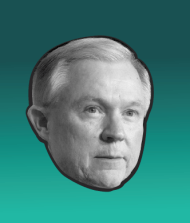
BIOGRAPHY: Longtime Alabama Senator. A U.S. attorney for the Southern District of Alabama, Sessions was tapped for a federal district judgeship by President Reagan in 1986 but his nomination ran aground over allegations of racially provocative comments. He was was elected the state’s attorney general in 1994 and U.S. Senator in 1996. In February, he became the first sitting Senator to endorse Trump’s presidential campaign.
CORPORATE TIES: No known corporate posts.
CAMPAIGN DONATIONS: Veteran fundraiser. Since 1995, Sessions’ campaign committee and a leadership PAC have raised $18.6 million in donations, mostly from Southern donors. He is not much of a campaign donor, however, having given just $1,250 of his own money over the years, though his leadership PAC gave nearly $1 million of other people’s money to Republican Senate candidates from 2004 to 2014. He did not donate in support of Trump’s campaign.
LOBBYING: Connected to lobbyists. Many of Sessions’ former colleagues in the Senate have moved on to lobbying gigs. Former Republican Sen. Trent Lott of Mississippi, now a major lobbyist, mentioned his longstanding friendship with the Alabama Senator when talking with the New York Times in November about lobbying the Trump Administration.
Steve Mnuchin, Secretary of Treasury

BIOGRAPHY: Wall Street investor. Mnuchin followed in his father’s footsteps, joining investment bank Goldman Sachs at the age of 22 and working there 17 years. He later briefly worked for financier George Soros, started his own hedge fund and worked as a Hollywood producer on such movies as “Batman v Superman” and “Suicide Squad.” He served as national campaign finance chairman for Trump..
CORPORATE TIES: Goldman Sachs, CIT Group (which bought OneWest, a subprime mortgage lender that later received $900 million in federal bailout money) and Sears Holding Corp.
CAMPAIGN DONATIONS: Major donor. Mnuchin gave at least $425,000 to the Trump Victory Fund, a joint Trump-RNC Fundraising Committee, and also served as the national finance chair for the Trump campaign.
LOBBYING: Employed lobbyists. In 2009 and 2010, when he was part of management of OneWest Bank, the bank reported spending $90,000 lobbying the federal government. During 2015 and 2016, when he was a director at CIT Group, the regional bank reported spending nearly $4.4 million on federal lobbying. (He stepped down in December after being named as Trump’s pick for Treasury.) Mnuchin sat on the board of Sears Holding Corp from 2005 to 2016, years in which the company spent $7.4 million lobbying the federal government.
James Mattis, Secretary of Defense

BIOGRAPHY: Retired Marine general. A native of Pullman, Wash., Mattis joined the U.S. Marine Corps in 1969, working his way up to four-star general over a 41-year career. Nicknamed “the Warrior Monk” and “Mad Dog,” he led troops in Kuwait during the first Persian Gulf War, in Afghanistan in 2001 and in Iraq in 2003. He retired in 2013 after serving as head of U.S. Central Command, overseeing U.S. forces in the Middle East.
CORPORATE TIES: General Dynamics, Theranos. In 2013, Mattis was elected to the board of directors of General Dynamics, a defense contractor, receiving equity awards worth more than $112,000 in value in 2014 and $140,000 in 2015. In 2013, he also joined the board of Theranos, a blood-testing startup that is under civil and criminal investigation. The Wall Street Journal reported that as head of the U.S. Central Command, he pressed for Theranos equipment to be used.
CAMPAIGN DONATIONS: No donations to federal candidates.
LOBBYING: Employed lobbyists. Since he joined General Dynamics in 2013, the company has spent $39.9 million lobbying the federal government. In 2015 and 2016, when he was on its board, Theranos spent $600,000 on federal lobbying.
John Kelly, Secretary of Homeland Security

BIOGRAPHY: Retired Marine general. A Boston native, Kelly first joined the U.S. Marine Corps in 1970, rising through the ranks to lead troops in Iraq in 2008 and 2009. He retired in 2016 after a 45-year career, including a stint as head of U.S. Southern Command, overseeing U.S. military activities in South and Central America, including the military jail at Guantanamo Bay. His son, Lt. Robert Michael Kelly, was killed in action in Afghanistan.
CORPORATE TIES: No known corporate posts.
CAMPAIGN DONATIONS: No donations to federal candidates.
LOBBYING: No known lobbying activity.
Ben Carson, Secretary of Housing and Urban Development

BIOGRAPHY: Retired neurosurgeon. Raised by a single mother in poverty in Detroit, Carson earned a scholarship to Yale and became director of pediatric neurosurgery at Johns Hopkins Hospital in Baltimore. He wrote several books, including an autobiography, “Gifted Hands,” which was turned into a made-for-TV movie. After retiring in 2013, he became a conservative activist, running unsuccessfully for president before endorsing Trump.
CORPORATE TIES: Kellogg, Costco, Vaccinogen. Carson joined the board of directors of cereal maker Kellogg in 1997 and Costco grocery retailer in 1999, resigning both positions when he launched his presidential campaign in 2015. He also that year resigned as chairman of the board for Vaccinogen, a Baltimore company working on a cancer vaccine. He served on advisory boards for HomeCentris Healthcare and biotech company Berg LLC.
CAMPAIGN DONATIONS: Major fundraiser. Carson raised over $82.4 million for his unsuccessful presidential campaign, a serious haul for a first-time candidate. A superPAC in support of his candidacy, the 2016 Committee, raised $15 million of that amount. He’s not much of a donor, however, giving $6,250 to Republican candidates and another $1,050 to Democratic candidates over the years.
LOBBYING: Employed lobbyists. From 1998 to 2015, when he was on its board of directors, Kellogg spent more than $15.4 million on lobbying the federal government.
BETSY DeVOS, SECRETARY OF EDUCATION
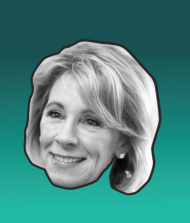
BIOGRAPHY: Billionaire philanthropist. A Holland, Mich., native, DeVos became a philanthropist and conservative education activist after marrying an heir to the Amway Corp. fortune. In Michigan, she pushed for private school vouchers and supported philanthropic causes in Christian communities. She was elected chairwoman of the Michigan Republican Party four times between 1996 and 2005.
CORPORATE TIES: Windquest Group. Along with her husband, Dick, she started the Windquest Group, a privately held investment and management firm that has invested in everything from boxed water to clean energy. She has been the director and Chief Creative Officer of the Stow Company, a home organization company. She and her husband are reportedly indirect investors in Social Finance Inc., a company that refinances student loans.
CAMPAIGN DONATIONS: Mega-donor. DeVos is one of the biggest Republican donors in the country. She and her husband have given almost $7.8 million to federal Republican candidates over the years, plus millions more in Michigan state politics. In the 2016 Republican primary, she backed former Florida Gov. Jeb Bush, former HP CEO Carly Fiorina and Florida Sen. Marco Rubio, criticizing Trump in an interview.
LOBBYING: Headed major lobbying efforts. In 2010, she founded the American Federation for Children, which backs vouchers and charter school efforts, serving as chairwoman until November. In 2015 and 2016, the advocacy group spent $150,000 on federal lobbying. She previously headed All Children Matter, an advocacy group that lobbied for school choice and was fined $5.3 million for campaign finance violations in Ohio, which it still owes.
Elaine Chao, Secretary of Transportation

BIOGRAPHY: Former Labor Secretary. Born in Taiwan, Chao emigrated to the United States at the age of eight. After earning an MBA at Harvard Business School, she served as director of the Peace Corps and president and CEO of the United Way of America before serving as the Secretary of Labor under President George W. Bush for eight years. She has also been a fellow at the conservative Heritage Foundation and a contributor to Fox News.
CORPORATE TIES: Wells Fargo, NewsCorp, Ingersoll Rand, Vulcan Materials. In 2011, Chao was elected to the board of directors for Wells Fargo bank. In 2012, she joined the board of NewsCorp, a media company that owns the Wall Street Journal and the New York Post. In 2015, she joined the boards of the Ingersoll Rand, a manufacturing conglomerate, and Vulcan Materials Co., a producer of construction materials.
CAMPAIGN DONATIONS: Big donor. Along with her husband, Senate Majority Leader Mitch McConnell, Chao has given $195,960 to Republican candidates over the years.
LOBBYING: Employed lobbyists. Since 2011, Wells Fargo has spent $37 million lobbying the federal government. NewsCorp, which split into two companies in 2013, spent $1.2 million from 2014 to 2016. Ingersoll Rand spent $1.4 million in 2015 and 2016, while Vulcan Materials spent $890,000 on lobbying those two years. In total, she has served on boards of corporations that have spent almost $40.5 million lobbying the federal government.
Andy Puzder, Secretary of Labor

BIOGRAPHY: Fast-food executive. Puzder started his career as a corporate lawyer in St. Louis. Carl Karcher, founder of the Carl’s Jr. restaurant chain, was facing serious financial difficulties and asked him to become his personal attorney. After successfully resolving Karcher’s problems, Puzder eventually became executive vice president of CKE, which owns the Carl’s Jr. and Hardee’s chains. In 2000, he became president and CEO.
CORPORATE TIES: CKE Restaurants.
CAMPAIGN DONATIONS: Major donor. Puzder has donated more than $1.3 million to Republican candidates over the years, plus another $7,859 to Democratic candidates. In the 2016 Republican primary, he backed former Florida Gov. Jeb Bush, Florida Sen. Marco Rubio, former HP CEO Carly Fiorina. He gave $10,000 to Rebuilding America Now, a pro-Trump super PAC, gave $75,000 to a Trump joint fundraising committee with the RNC, and he and his wife gave $5,400 to Trump directly in 2016.
LOBBYING: Employed lobbyists. CKE has not lobbied the federal government much, spending only $30,000 on lobbying in 2008.
Rick Perry, Secretary of Energy

BIOGRAPHY: Former Texas governor. After a stint in the U.S. Air Force, Perry served in the Texas House of Representatives, then as agriculture commissioner and lieutenant governor. After then-Gov. George W. Bush resigned to become president in 2000, Perry became governor, a position he held until 2015. He ran unsuccessfully for president in 2012, memorably forgetting the Department of Energy at a debate, and again in 2016.
CORPORATE TIES: Sunoco Logistics Partners, Energy Transfer Partners. In 2015, Perry joined the board of directors of Sunoco Logistics Partners, which transports and stores oil, and the board of Energy Transfer Partners, a natural gas pipeline company that is parent to the company behind the controversial Dakota Access pipeline. He earned more than $365,000 in 2015 for sitting on the two boards.
CAMPAIGN DONATIONS: Veteran fundraiser. His 2012 presidential campaign raised $19.7 million and was backed by $5.6 million from a super PAC. His 2016 campaign raised $1.4 million and was backed by $15.2 million from various super PACs. He also raised more than $116.6 million in his campaigns for lieutenant governor and governor in Texas. He has not donated to federal candidates.
LOBBYING: Employed lobbyists. Energy Transfer Partners’ parent company Energy Transfer Equity, spent more than $2.4 million lobbying the federal government since Perry joined the board in 2015.
Wilbur Ross, Secretary of Commerce

BIOGRAPHY: Billionaire investor. A native of New Jersey, Ross became an expert on bankruptcy while working for the investment bank Rothschild Inc. In 2000, he started his own private equity firm, WL Ross and Company, and became known as the “King of Bankruptcy” for investing in failing steel and mining companies and turning them around at a profit. He sold his firm to Invesco in 2006.
CORPORATE TIES: WL Ross and Company, Invesco, International Coal Group. Ross also sits on the boards of ArcelorMittal (the world’s largest steel company,) Exco Resources (an oil and gas company,) Nexeo Solutions (an industrial chemical and plastics distributor,) and two banks: the Bank of Cyprus and Sun National Bank.
CAMPAIGN DONATIONS: Major donor. Ross has given $956,334 to federal Republican candidates over the years and another $49,800 to Democrats. He gave the maximum of $5,400 to Trump’s campaign.
LOBBYING: Employed lobbyists. Ross sits on many corporate boards with hundreds of lobbying priorities. Between WL Ross & Company, Invesco, International Coal Group and ArcelorMittal, Ross’s companies have spent more than $17.4 million lobbying the federal government.
David Shulkin, Secretary of Veterans Affairs
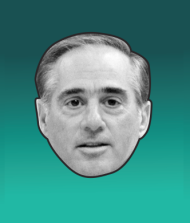
BIOGRAPHY: Veterans Affairs deputy. Currently, Sulking serves as under-secretary for Veterans Affairs under President Obama. Before that, he was a physician and ran hospital systems, and served as the Chairman of the Board of New Jersey Council of Teaching Hospitals.
CORPORATE TIES: Morristown Medical Center, Atlantic Health System, Beth Israel Medical Center, University of Pennsylvania Health System. Shulkin was President of the Morristown Medical Center in New Jersey, Vice President of the Atlantic Health System, and CEO of Beth Israel Medical Center in New York City. He was also the Chief Medical Officer of the University of Pennsylvania Health System.
CAMPAIGN DONATIONS: He’s donated $3,600 over the course of his lifetime, mostly to Democratic candidates. His most recent donation was in 2014.
LOBBYING: Beth Israel Medical Center spent $645,000 on lobbying while he was CEO from 2005-2009, and Atlantic Health System spent $400,000 on federal lobbyists while he was there.
Ryan Zinke, Secretary of Interior

BIOGRAPHY: First-term Congressman. After earning a degree in geology from the University of Oregon, Zinke served as a Navy SEAL from 1986 to 2008. In 2014, he was elected to the U.S. House of Representatives at-large seat in Montana after campaigning on a platform of North American energy independence. In Congress, he served on the House Natural Resources Committee.
CORPORATE TIES: STWA. In 2012, while still a state Senator, Zinke joined the board of STWA, a company which develops oil and gas delivery systems. He does not currently appear to be on the board.
CAMPAIGN DONATIONS: Fundraiser. In his two campaigns for Congress, Zinke raised $10.2 million. A leadership PAC, Supporting American Leaders, raised another $3 million in the 2016 cycle. Zinke has not given any of his own money to federal candidates, but his leadership PAC gave $54,200 to members of Congress, nearly all Republicans.
LOBBYING: No known lobbying activity.
Reince Priebus, White House Chief of Staff

BIOGRAPHY: Former Republican party head. The former Chair of the Republican National Committee came from leading the Wisconsin GOP, where he helped propel state leaders like Paul Ryan and Scott Walker to national prominence.
CORPORATE TIES: Priebus worked as a corporate lawyer for Michael Best & Friedrich firm but went on leave when he assumed the leadership of the RNC in 2011.
CAMPAIGN DONATIONS: Most of Priebus’s personal donations have gone to fellow Wisconsin Republicans or the GOP. But as chairman of the Republican National Committee, he was responsible for raising and distributing at least $562 million for the 2016 Presidential campaign.
LOBBYING: Connected to lobbyists. Priebus’s old law firm, Michael Best, represents clients in the agribusiness, energy, and food and beverage industry, among others.
Mike Pompeo, CIA Director

BIOGRAPHY: U.S. Representative from Kansas. A graduate of West Point, Pompeo served in the U.S. Army from 1986 to 1991, reaching the rank of captain. He went on to get a degree from Harvard Law School and was first elected to the U.S. House of Representatives from Kansas as part of the Tea Party sweep in 2010.
CORPORATE TIES: Thayer Aerospace, Sentry International. He started his first company, Thayer Aerospace, with funding from Koch Industries (that company was subsequently sold.) His second company, Sentry International, was a Wichita-based oil-rig company.
CAMPAIGN DONATIONS: Donor and fundraiser. Pompeo has given $18,034 to Republican candidates and $273 to Trump and his allies. As a candidate, he has received generous backing from the Koch brothers, who gave him $375,000 over the course of his career. Pompeo was the top recipient of Koch funding in the 2010 elections.
LOBBYING: Connected to lobbyists. Pompeo has close ties to the Koch brothers, two of the most powerful political donors in the country, who often donate to candidates pledging to reduce government efforts on health care and climate change.
Scott Pruitt, Head of the Environmental Protection Agency
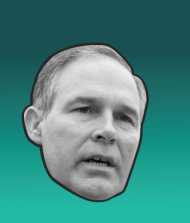
BIOGRAPHY: Oklahoma attorney general. After moving to Oklahoma to attend law school, Pruitt worked as a lawyer and was elected to the state Senate, where he served for eight years. After unsuccessful campaigns for Congress and lieutenant governor, he was elected state attorney general in 2010. In that position, he sued the Environmental Protection Agency over its regulations on power plants. He was re-elected in 2014.
CORPORATE TIES: No known corporate posts. But Pruitt has close ties with oil and gas companies, and the New York Times reported in 2014 that a letter he sent to the EPA was written almost entirely by executives from Devon Energy, an Oklahoma energy company.
CAMPAIGN DONATIONS: Fundraiser. Pruitt raised more than $3 million dollars for his state campaigns in Oklahoma, attracting support from the energy industry. According to the Tulsa World, he also has ties to Oklahoma Strong Leadership PAC, a federal super PAC that raised more than $391,000 in 2016, and Liberty 2.0, a federal super PAC that raised more than $450,000 in 2016. He has given just $1,000 of his own money to federal Republican candidates over the years.
LOBBYING: No known lobbying activity, except for his unusually close relationships with Oklahoma oil and gas companies.
LINDA McMAHON, HEAD OF THE SMALL BUSINESS ADMINISTRATION

BIOGRAPHY: Pro wrestling executive. A North Carolina native, McMahon co-founded the company now known as World Wrestling Entertainment with her husband Vince in 1980. In 2010 and 2012, she spent almost $100 million of her own money on unsuccessful bids for U.S. Senate seats in Connecticut, calling for eliminating the Small Business Administration in her second run.
CORPORATE TIES: WWE.
CAMPAIGN DONATIONS: Mega-donor. McMahon and her husband have given $14.7 million to Republicans over the years, and they were one of the top GOP donors in the country in 2016. She personally spent $97 million running for Senate twice. Between 2007 and 2009, the McMahons gave $5 million to Trump’s charitable foundation. In 2016, she gave $2,700 to Trump’s campaign and $6 million to Rebuilding America Now, a super PAC backing him.
LOBBYING: Employed lobbyists. Between 2001 and 2008, the WWE spent $580,000 lobbying the federal government on issues like marketing to minors and steroid use in wrestling.
Nikki Haley, United Nations Ambassador
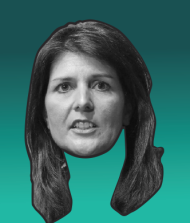
BIOGRAPHY: South Carolina governor. The daughter of Sikh immigrants, Haley helped with the bookkeeping at her mother’s clothing shop at a young age. After earning a degree in accounting from Clemson University, she worked for a recycling company and then again for her mother’s business, Exotica International. She started her political career in the South Carolina House of Representatives in 2005 and was sworn in as Governor in 2011.
CORPORATE TIES: No known corporate posts.
CAMPAIGN DONATIONS: Haley has raised $12.7 million over her five South Carolina campaigns, mostly from small donors (her most expensive election was her 2014 re-election campaign, where she raised more than $8.4 million.) She was supported by the Free & Strong America PAC.
LOBBYING: No known lobbying activity.
Mick Mulvaney, Director of the Office of Management and Budget

BIOGRAPHY: South Carolina Congressman. Elected in the Tea Party wave of 2010, Mulvaney helped found the House Freedom Caucus that ousted Speaker John Boehner, and was opposed to raising the debt ceiling.
CORPORATE TIES: No known corporate ties.
CAMPAIGN DONATIONS: Mulvaney has given $15,535 to Republican candidates, but none to Trump and his allies. As a candidate, he has raised $5.2 million across his six runs, including almost $45,000 from health insurance company Blue Cross/Blue Shield. As OMB chair, he would be help guide the unravelling of the Affordable Care Act.
LOBBYING: No known lobbying ties.
tom price, DIRECTOR OF health and human services
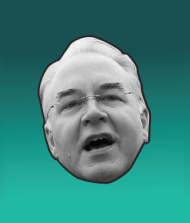
Bio: Orthopedic surgeon and Representative from Georgia since 2005 who was chair of the House Budget Committee and has spent years trying to dismantle the Affordable Care Act.
Corporate Ties: Prince invested as much as $90,000 in Eli Lilly, Bristol-Meyers Squibb, Amgen, McKesson, Biogen, and Pfizer before co-sponsoring legislation that benefited those companies’ bottom lines.
Campaign Finance: Price has raised almost $390,000 from the healthcare industry and $164,000 from the pharmaceutical industry since 2015.
Lobbying: He worked to remove onerous regulatory changes from pharmaceutical companies in which he had a financial investment. Those companies had all lobbied to stop the regulatory changes.
Jan. 17, 2017
